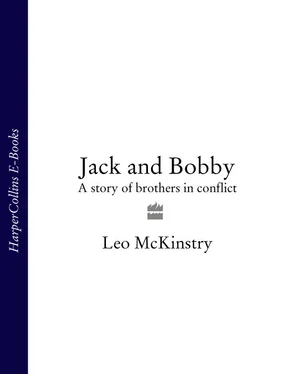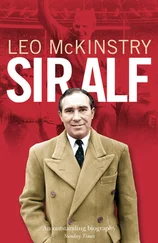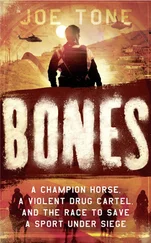JACK&BOBBY
Leo McKinstry

To James Perry,
whose devotion to Torquay United should have
resulted in a long spell in Broadmoor
Cover
Title Page JACK&BOBBY Leo McKinstry
Introduction
CHAPTER ONE: The Boys
CHAPTER TWO: The Migrants
CHAPTER THREE: The Rebel
CHAPTER FOUR: The Conformist
CHAPTER FIVE: The Victim
CHAPTER SIX: The Survivor
CHAPTER SEVEN: The Bighead
CHAPTER EIGHT: The Winger
CHAPTER NINE: The Husbands
CHAPTER TEN: The Internationals
CHAPTER ELEVEN: The Winners
CHAPTER TWELVE: The Players
CHAPTER THIRTEEN: The Rivals
CHAPTER FOURTEEN: The Losers
CHAPTER FIFTEEN: The Outcast
CHAPTER SIXTEEN: The Seniors
CHAPTER SEVENTEEN: The Managers
CHAPTER EIGHTEEN: The Eccentric
CHAPTER NINETEEN: The Failure
CHAPTER TWENTY: The Director
CHAPTER TWENTY-ONE: The Irishman
CHAPTER TWENTY-TWO: The Saint
CHAPTER TWENTY-THREE: The Sons
CHAPTER TWENTY-FOUR: The Millionaires
Epilogue
Career Appendix
Bibliography
Acknowledgements
Index
About the Author
Praise
Copyright
About the Publisher
The images of that Saturday afternoon in July 1966 have become forever ingrained on our national consciousness: Jack Charlton falling to his knees at the final whistle, his face buried in his hands as if in grateful, exhausted prayer; his brother Bobby crying freely as he climbs up to the Royal Box to collect his World Cup winner’s medal. It was a display of emotion that perfectly captured the mood of triumph and relief that swept across the country.
‘Nobody can ever take this moment away from us,’ said Bobby to his brother as they hugged each other at the end of the match. He was absolutely correct. Whatever else they have achieved in life, the two Charlton brothers will always be best remembered for their part in England’s glory of 1966. Indeed, their contrasting roles on the field symbolized the virtues of England’s performance during that unique campaign: Jack, the rock of the defence, ungainly but uncompromising, lacking sophistication but never valour, as tough and honest as the mining stock into which he was born; Bobby, the fulcrum of the attack, gliding across the turf like a thoroughbred, destroying opponents with his explosive goals, long-range passes and incisive runs. Never, it seemed, were there two more patriotic footballers, willing, in Churchill’s phrase, to give ‘blood, toil, tears and sweat’ in the national cause.
The bond between the brothers, forged at birth and reinforced by their mutual choice of a career in football, must have seemed unbreakable that day at Wembley. Any belief that they were close to each other can only have been strengthened by a host of other striking parallels about their lives. Both played the game obsessively in their youth and turned out for the same local YMCA side. Both joined major city clubs, Leeds and Manchester United, at exactly the same age, 15, and each won a cabinet-full of domestic honours. In 1965, they became the first brothers this century to play together for England. The links continued after the triumph of 1966. Both retired from First Division football in the same year, after careers of outstanding loyalty – each holds the League appearance record for their club, Jack with 629 for Leeds, Bobby with 606 for Manchester United. Both started in League management in the same 1973/74 season in the Second Division. Later, they both became major figures on the international stage, Jack as a brilliantly successful manager of the Republic of Ireland, Bobby as a roving ambassador for top-class sports bids, such as the campaign to bring the 2006 World Cup to England.
Brought up in a close-knit working-class mining community where the values of respectability were paramount, both have led lives of restraint and dignity. Given their celebrity status – Jimmy Hill once described Bobby, not unjustly, as ‘the most famous Englishman in the world’ – it would have been easy for either of them to have fallen into the destructive pattern of heavy drinking, financial chaos and private dissolution that has characterized the lives of too many sporting greats, such as George Best, James Hunt or Denis Compton. Yet there has never been a whiff of scandal about their personal lives, both of them enjoying remarkably strong, happy marriages, as well as becoming millionaires through football and business. As John Giles, of Leeds, Manchester United and Ireland, put it to me: ‘I think Bobby and Jack have been great ambassadors for both football and for working-class England, because they have always behaved impeccably throughout their careers, handling fame and fortune in a way that most people could not begin to comprehend. They have never put a foot wrong, never become big-headed or gone astray. There is an underlying decency about them which stems from that background.’
That spirit of honour extended to football, where they were seen by most of their colleagues as hard-working professionals, fiercely competitive by nature, who would never let their side down. ‘The great thing about Jack,’ says his former Leeds colleague Willie Bell, ‘was that he would absolutely never give up. I have seen Jack with blood running down his face and, even then, he would not come off the field. He would never surrender, even when we were down, and that attitude rubbed off on the rest of the team. He was just a great professional.’ It is a view echoed by David Harvey, the Leeds and Scotland goalkeeper, who told me: ‘It was very reassuring to have Jack in front of me. He was a bit of a Godfather, looking after me really well. He was so commanding, always shouting at the rest of us and organizing the defence like a military policeman. He always played to such a high standard. His consistency was first class, no matter what the occasion.’
Exactly the same views are expressed about Bobby. His teammate David Sadler says, ‘Bobby had a terrific appetite and energy for the game and always worked so hard for the team. He took the knocks, which are part and parcel of football, and just got on with it.’ Martin Buchan recalls him as an ideal professional, even at the end of his career: ‘He was so utterly dedicated, dedicated to both United and to football. He was a wonderful example to any youngster coming into the game. I remember once, in his last season, he was left out of the team and when he got the news, he did not storm out of the ground, as a lot of other players would have done, but instead put his kit on and did several laps around the pitch, just so he would remain fit. That was the kind of man he was, always working so hard.’ It was because of this outlook that both Bobby and Jack fitted easily into Sir Alf Ramsey’s England team of the 1960s, where so much emphasis was placed on the work ethic.
Yet, for all such superficial similarities, the really fascinating point about Jack and Bobby is how utterly different they are. Almost every person who knows them says that they are ‘chalk and cheese’ – so dissimilar that it is hard to believe that they are from the same family. ‘The difference between them is enormous,’ says Ian Greaves, the former Manchester United player, who went on to be a highly successful manager at Huddersfield, Bolton and Mansfield. ‘You would not take them for brothers at all. I remember Jack in his early days at Leeds: loud, ebullient, down to earth and very, very stubborn. All he wanted to do was party and fight. He was so unlike Bobby, who was very quiet, shy, polite.’ Joe Carolan, another Manchester United player, agrees: ‘Jack is a different kettle of fish altogether from Bobby. Bobby was a gentleman, whereas Jack would kick you straight up in the air. Jack would never shut up on the field, but you hardly ever heard a word out of Bobby.’
Читать дальше













